Dua For Qunoot In Witr Prayer: Transliteration, Meaning, and Arabic
Dua for qunoot is a special supplication which is offered during prayer at a specific point and is recommended when a calamity befalls Muslims and in witr prayer.
Advertisements
What Is Dua For Qunoot?
Qunoot is the name of a dua (supplication) offered during prayer at a specific point while standing. Dua e qunoot is recommended in witr prayer and when a calamity befalls Muslims.
Dua E Qunoot In Arabic Text
Here is how to write Dua e qunoot in Arabic text
اللَّهُمَّ اهْدِنِي فِيمَنْ هَدَيْتَ وَعَافِنِي فِيمَنْ عَافَيْتَ وَتَوَلَّنِي فِيمَنْ تَوَلَّيْتَ وَبَارِكْ لِي فِيمَا أَعْطَيْتَ وَقِنِي شَرَّ مَا قَضَيْتَ إِنَّكَ تَقْضِي وَلاَ يُقْضَى عَلَيْكَ وَإِنَّهُ لاَ يَذِلُّ مَنْ وَالَيْتَ وَلاَ يَعِزُّ مَنْ عَادَيْتَ تَبَارَكْتَ رَبَّنَا وَتَعَالَيْتَ.
Dua Qunoot Transliteration
The transliteration of dua for qunoot is Allahumma ihdini feeman hadayt, wa a’fini fiman afait, wa tawallani fiman tawallait, wa barik Li fima atait, wa qini sharra ma qadait, fa Innaka taqdi wa la yuqda Alaik, wa innahu la yadhillu man walait, tabarakta Rabbana wa ta’alait.
Advertisements
Dua For Qunoot Meaning In English
The meaning of Dua for qunoot is O Allaah, guide me with those You have guided, heal me with those You have healed, care for me as a companion with those You have cared for, bless me in what You have given, and protect me from the evil of what You have decreed. Indeed, You decree while no one decrees against You. Whomever You show loyalty towards will never be humiliated, and whoever You show enmity towards will never be honored. Blessed are You, our Lord, and You are exalted far above (any deficiencies).
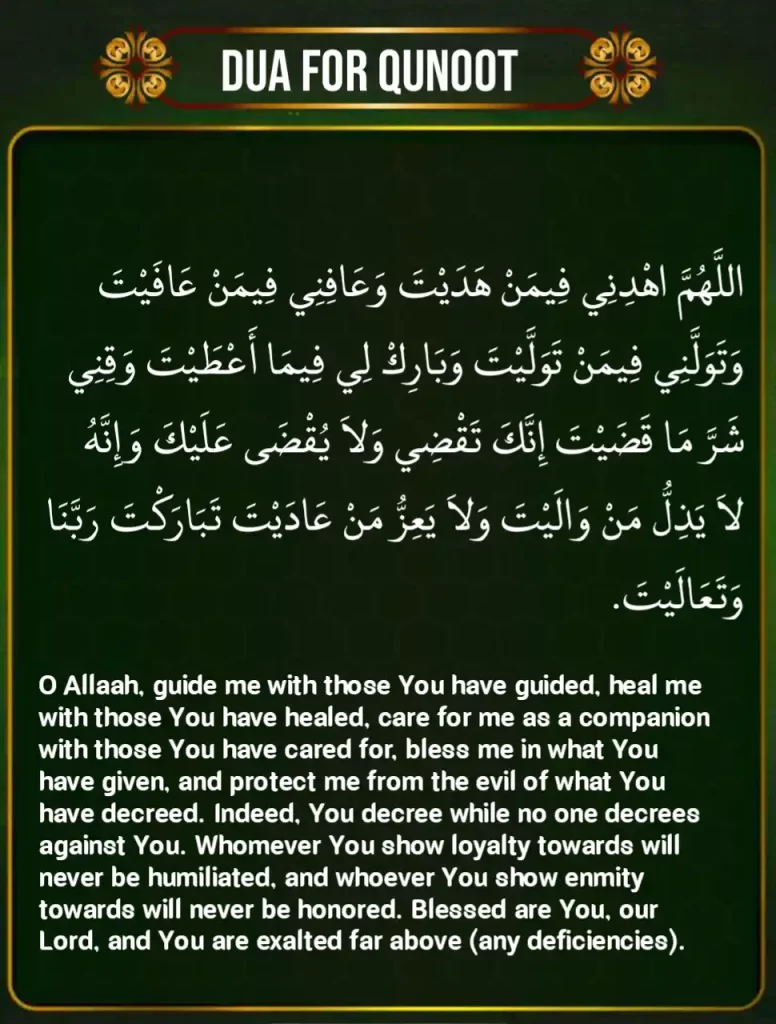
Qunut at times of calamity (Qunut al-Nazilah)
When praying Qunut at the time of calamity, one should make supplication as is appropriate to the situation, as it was narrated that the Prophet (peace and blessings of Allah be upon him) cursed some Arab tribes who had betrayed his Companions and killed them, and he prayed for the weak and oppressed believers in Makkah, that Allah would save them.
It was narrated that ‘Umar prayed Qunut with the following words:
اَللَّهُمَّ إنا نَسْتَعِينُكَ وَنَسْتَغْفِرُكَ وَنُؤْمِنُ بِكَ وَنَتَوَكَّلُ عَلَيْكَ وَنُثْنِئْ عَلَيْكَ الخَيْرَ وَنَشْكُرُكَ وَلَا نَكْفُرُكَ وَنَخْلَعُ وَنَتْرُكُ مَنْ ئَّفْجُرُكَ اَللَّهُمَّ إِيَّاكَ نَعْبُدُ وَلَكَ نُصَلِّئ وَنَسْجُدُ وَإِلَيْكَ نَسْعأئ وَنَحْفِدُ وَنَرْجُو رَحْمَتَكَ وَنَخْشآئ عَذَابَكَ إِنَّ عَذَابَكَ بِالكُفَّارِ مُلْحَقٌ
Transliteration
Advertisements
Allahumma inna nasta’inuka wa numinu bika, wa natawakkalu ‘alayka wa nuthni ‘alayka al-khayr, wa la nakfuruka. Allahumma iyyaaka na’budu wa laka nusalli wa nasjudu, wa ilayka nas’a wa nahfid. Narju rahmataka wa nakhsha ‘adhabaka, inna ‘adhabaka al-jadd bil kuffari mulhaq.
Qunoot Dua In English
O Allah, verily we seek Your help, we believe in You, we put our trust in You and we praise You and we are not ungrateful to You. O Allah, You alone we worship and to You we pray and prostrate, for Your sake we strive. We hope for Your mercy and fear Your punishment, for Your punishment will certainly reach the disbelievers.
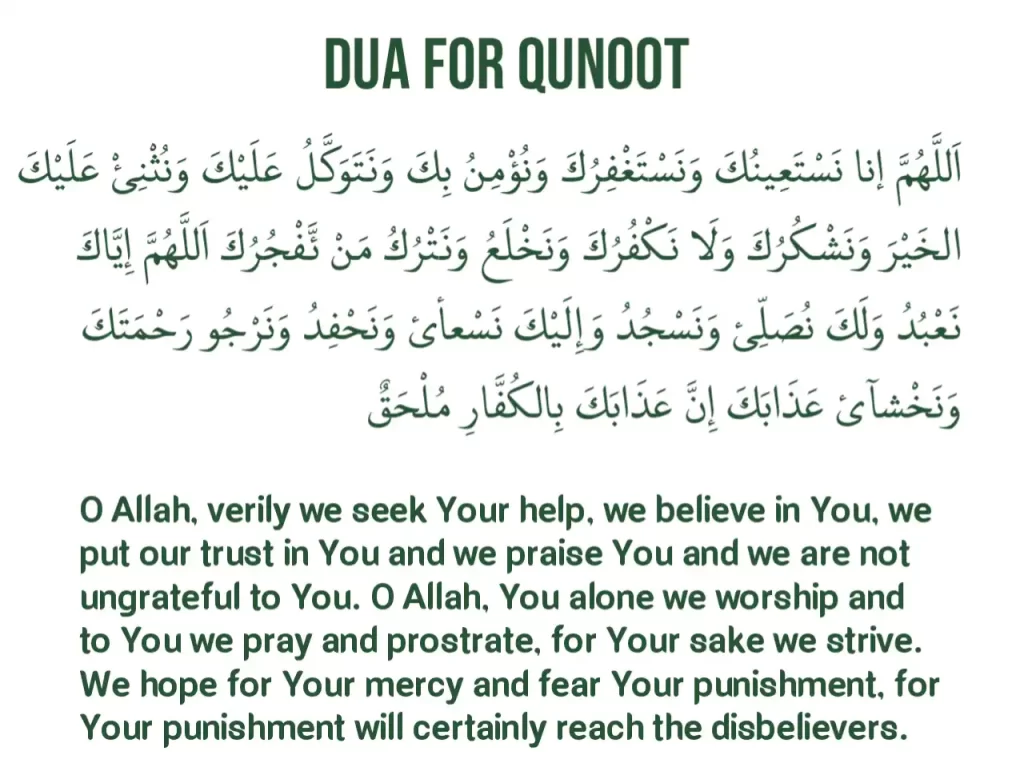
Dua Qunoot Audio
Here is the audio and video of dua for qunut.
Advertisements
When Do You Read Dua Qunoot In Witr?
According to more correct of two scholarly opinions, the Dua is prescribed in the Witr prayer after the ruku’ (bowing).
If a calamity (nazilah) befalls the Muslims, it is prescribed to say Dua Qunoot after standing up from ruku’ in the last rak’ah of each of the five daily obligatory prayers, until Allah relieves the Muslims of that calamity.
Most of the ahadith and the opinion of most of the scholars state that Qunut comes after ruku’, but if you say Qunut before ruku’ that is acceptable.
So you have the choice of doing ruku’ when you have finished reciting Quran, then standing up and saying “Rabbana wa laka al-hamd” then saying Qunut… or saying Qunut when you have finished reciting Quran, then saying “Allahu akbar” and bowing. Both of these were narrated in the Sunnah.
Dua E Qunoot In Explanation
This is a concise explanation of the dua, or supplication that is said during the Witr prayer.
This explanation was given by Shaykh Muhammad Ibn Saalih al-‘Uthaymeen, may Allaah have mercy on him, during his lectures which he used to present in the central mosque in Mecca (al-Masjid al-Haraam) during the blessed month of Ramadhaan.
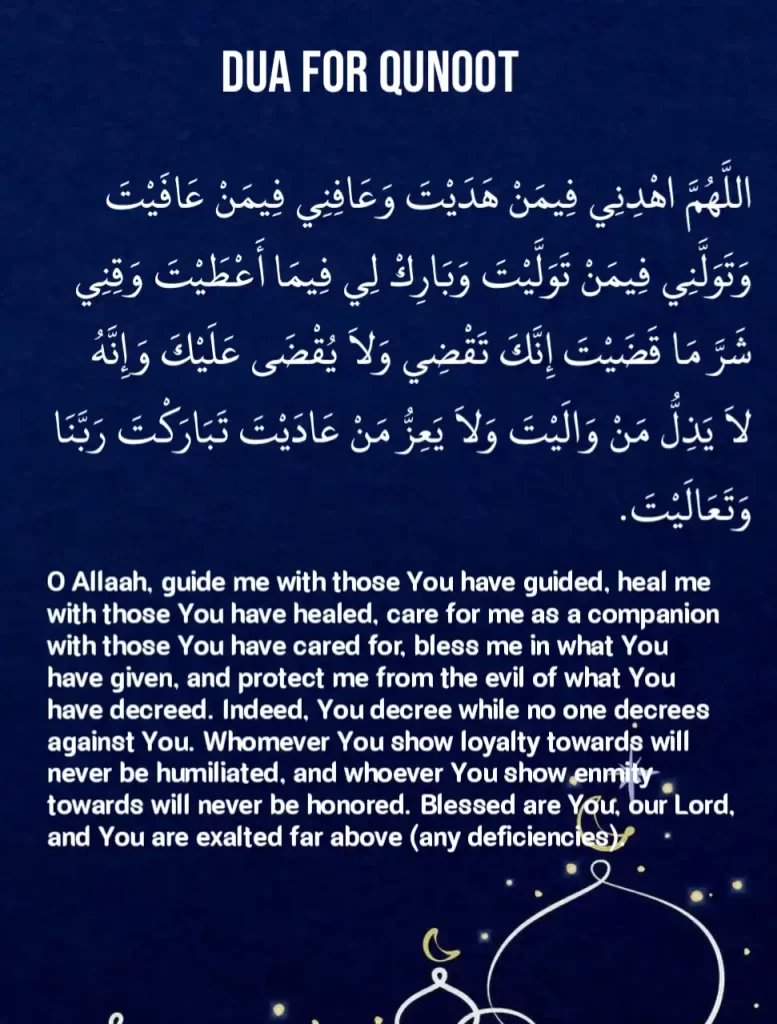
O Allaah, guide me with those You have guided…”
Meaning: Guide me to the truth and assist me in acting in accordance with it.
Complete, beneficial guidance is that in which Allaah combines for a servant in both knowledge and action.
Guidance without action is of no real benefit; rather it is even harmful because if a person does not act in accordance with what he knows, his knowledge then becomes evidence against him.
An example of guidance in the form of knowledge yet with no action is the verse of Allaah,
“As for Thamood, We guided them, but they preferred blindness over guidance.”
Soorah Fussilat, 41:17
Meaning: We clarified the path to them and We conveyed the knowledge to them. However, they preferred blindness over guidance, and from this we seek refuge with Allah.
Also from this type of guidance, which is knowledge and clarifying the truth, is the statement of Allaah to the Prophet
And indeed, you guide to the straight path.
Soorah ash-Shooraa, 42:52
Meaning: You direct the people to the straight path and teach them about it.
As for the other type of guidance which is the granting of success, an example of this type is the verse,
Indeed, you do not guide whoever you like.
Soorah al-Qasas, 28:56
This is the guidance of granting one success in their deeds. In this case, the Messenger is never able to grant someone the success of their good actions as this type of guidance is specific to Allaah alone.
So when we say in the Dua of Qunoot, “Guide us with those You have guided,” we are asking Allaah for both types of guidance, the guidance of knowledge and the guidance of action.
In this way, the following verse includes both of these types of guidance,
“Guide us to the straight path.” [Soorah al-Faatihah, 1:6]
So when one says this Dua, he should, with his heart present, call to mind that he is asking for both types of guidance, the guidance of the correct knowledge and the guidance of acting in accordance with it.
As for the wording, …with those You have guided,”
this is a way of at-Tawassul (seeking nearness to Allaah) by mentioning His favors on others in that He guided them.
So we therefore also ask Him to bestow the same favor upon us and guide us.
In other words, we ask You (Allaah) for guidance, for that is only by virtue of Your mercy and wisdom and your past favors as You have guided others.
…heal me with those You have healed…”
Meaning: Heal us from the sicknesses of the heart as well as the physical sicknesses of the body.
So my brother, you must bring to mind, while your heart is fully present, that while you are calling upon Allaah, He will heal you of both the diseases of the body and those of the heart.
And it must be understood that the diseases of the heart are much worse than physical diseases.
For this reason, some people say while making Dua,
O Allaah, do not make our tribulations in our religion.”
The bodily diseases and sicknesses are well-known, yet the diseases of the heart come in two main ways:
- Diseases of vain desires, and they originate from one’s personal likes and dislikes.
- Diseases of doubts and uncertainties, and they originate from ignorance.
As for the first, the diseases of one’s personal desires, is that a person may know the truth, yet may not want to follow it due to some personal preferences, which are contrary to what the Prophet SAW came with.
And as for the second type of diseases, that of doubts and false superstitions due to one’s ignorance, it is when an ignorant person does incorrect actions while assuming they are correct. This disease is extremely dangerous.
So you ask Allaah for healing and immunities from both, the diseases of the body and of the heart, which are the sicknesses of doubts and false assumptions, and vain desires.
…care for me as a companion with those You have cared for…
Meaning: Be a close, watchful companion and ally to us.
This type of al-Walaayah (companionship or guardianship) is of two types, a general type of guardianship, and a specific type.
The specific type is particular to the believers only as Allaah says:
Allaah is the Ally, Guardian of those who believe. He brings them out from darkness into light. In addition, those who disbelieve, their allies, guardians, are their false gods. They take them out of light into darkness. Those are the companions of the Fire; they will abide eternally therein.
Soorah al-Baqarah, 2:257
So you ask Allaah for this special type of alliance, guardianship, and companionship which includes His protection of the one to whom Allaah gives it to.
It also includes Allaah granting success to him or her in following what He loves and is pleased with.
As for the general type of guardianship, it includes everyone. Allaah is carefully watching over every person as He says,
…until when death comes to one of you, Our Messengers (angels) take him, and they never fail in their duties.
Soorah al-An’aam, 6:61
This is general for everyone. However, when we say,
O Allaah, care for me as a companion with those You have cared for,” we want the specific type of alliance, guardianship, and companionship and, as has been said, it includes protection and the success in following what Allaah loves and is pleased with.
…bless me in what You have given…”
The word (Barakah) “blessing” literally means a lot of anything good that is continuous.
The scholars even trace this word and its meaning back to the word. (Birkah) which means a large amount of water.
It is any wide container or gathering of water that continuously contains a large amount of water. Similarly, blessing is also a continuously large amount of good.
So the meaning of this statement is: Send blessings down upon that which You have given me.
The wording, “in what You have given” is comprehensive including anything Allaah has given us of wealth, children, knowledge, and everything else Allaah has bestowed upon us.
Therefore, you ask Allaah to put blessings in all of that. If Allaah does not put blessings into that which He has given you, a great amount of good will surely be prevented from you.
How many people possess a vast amount of wealth, yet it is as if they are living in poverty?
This is because they gain no real benefit from their wealth; they simply collect it and never benefit from it.
This is the result of the blessings being removed from it.
Likewise, many people have lots of children and grandchildren, yet they do not benefit their parents in anything due to their disobedience and ungratefulness.
Such people have not been blessed in their children. You also find some people to whom Allaah has given a great amount of knowledge, yet it is as if he is illiterate.
You see no traces of knowledge upon him in his worship, in his character, in his manners, or in the way he treats others.
Rather, his knowledge may even increase him in arrogance and thinking himself to be above the rest of Allaah’s servants, belittling and humiliating them.
Such a person does not realize the one who bestowed this knowledge upon him is none other than Allaah.
You see that he never benefits people with his knowledge, neither with lessons, nor advice, nor with writings.
On the contrary, he is exclusively centered only upon himself. This is without doubt a great deprivation, even though religious knowledge is one of the most blessed things Allaah gives to a servant.
One reason for this is that when you teach it to others and spread this knowledge among the people, you are rewarded for that and this is from many different perspectives:
- When you spread this religious knowledge, you do so for the religion of Allaah.
So you become from the Mujaahidoon in the path of Allaah: that is because you have opened the hearts to religious knowledge like the Mujaahid who conquers a land with rectification and faith.
- From the blessings of spreading knowledge and teaching it is that by doing so, there is the preservation and protection of Allaah’s legislation (the Sharee’ah).
If it were not for the passing on of knowledge, the legislation would not have been preserved.
- Also from the blessings of spreading knowledge is that when you teach others, you are doing them a great deal of good.
You give them insight into the religion of Allaah.
Moreover, when the servant then worships Allaah with knowledge and insight, similar rewards they are given will be your reward, because you directed them towards a particular good.
The one who directs another to do something good is just like the one who actually does it.
- Also, by spreading and teaching knowledge, one’s own knowledge increases.
It is known that anyone who teaches a particular knowledge to people, his knowledge in that subject will increase.
This is because in teaching, one is recalling what he previously learned and memorized as well as learning new things that he must prepare.
As for His decreeing that which is good, it is that which is certainly and absolutely good in itself – the decree and decision of it, and in that which results from it.
An example of good decree would be the decree and decision to provide mankind with sustenance, safety and security, tranquility, guidance, support, etc.
These are all good in their decree and its result. As for decreeing that which is evil, it is actually good in its decree (Allaah makes decisions only based on the highest level of wisdom) even though it may result in evil.
An example of this latter type would be a drought – the withholding of rain.
This results in evil (hardships upon the people), yet Allaah’s decreeing it is good.
Thus the proper meaning is: “Protect us from the evil that You decreed” Allaah Most High decrees with evil due to (His) complete and commendable wisdom.
Indeed, You decree while no one decrees against You”
Allaah decrees and decides both the legislative decree (that which He likes and commands and may or may not happen) and the universal decree (that which He may or may not like, yet must happen).
Allaah decrees and decides everything that happens due to His infinite, perfect wisdom.
As for the wording, “no one decrees against You,” this means that there is none other that can decree anything over and beyond His will.
So the servants will never judge or make any decision over Allaah’s, while Allaah will certainly judge them.
And He will question His servants, and no one will ever question Him.
Whoever You show loyalty towards will never be humiliated.”
This sentence and the next one “…and whoever You show enmity towards will never be honored.” both provide more explanation and details of our previous request,
Care for me as a companion with those You have cared for.”
If Allaah watches over and guards a person as a companion would, then he would definitely never be humiliated.
On the contrary, if He were to show enmity towards someone, such a person would never be honored.
So this requires us to seek honor only from Allaah alone and we fear and seek refuge from being dishonored and disgraced before Allaah.
It is not possible for one to be truly humiliated and disgraced when Allaah has become his companion and guardian.
The important thing is to try to achieve this type of companionship with Allaah. Yet, how does one gain His companionship and loyalty?
This kind of allegiance, companionship, and loyalty is achievable by actualizing two significant characteristics, both of which Allaah has clarified in His book.
Those who believe” is in the heart, and “…and are constantly, fearfully conscious (of Allaah)” occurs upon the limbs.
So when the heart and limbs are pure and correct, people gain this alliance and companionship by virtue of these two characteristics.
Whoever is a true believer who constantly remains conscious of Allaah, then Allaah will be an ally, a guardian, and a companion to him.
This is correct because the Qur’aan indicates this.
…and whoever You show enmity towards will never be honored.
Meaning: Whoever is an enemy to Allaah will never have honor. On the contrary, he will taste humiliation, regret, and failure. Every disbeliever is in disgrace and worry.
For this, if the Muslims actually possessed the honor of Islaam, the dignity of religion and the alliance and loyalty of Allaah, the disbelievers would not be in the position they are in now in which we find ourselves humiliated under them.
We secretively look to them with honor and respect, while looking amongst ourselves with disgrace and shame.
This is because most Muslims today unfortunately do not truly adhere to their religion, nor do they sincerely seek to correctly learn it.
They rely solely upon the materialistic things of this life and its adornment.
For this, we have been afflicted with such disgrace that the disbelievers are honored among themselves.
So whoever opposes Allaah will eventually be humiliated and will never truly be honored except in the sense of someone imagining honor as in that which the disbelievers have.
As for the one who believes the real honor and dignity is unobtainable except by the close companionship and allegiance to Allaah and by remaining steadfast upon His religion, then he sees those who disbelieve in Allaah as none other than the most disgraced of Allaah’s creatures.
Blessed are You, our Lord, and You are exalted far above (any deficiencies).”
This is a form of praising and glorifying Allaah by mentioning these two noble descriptions.
All blessings are attributed to Allaah as He is the Possessor and Bestower of all blessings.
Blessed are You” meaning: Your goodness is unlimited and it encompasses the entire creation. Blessing, as we have previously mentioned, is anything good and continuous.
Our statement, “and You are exalted far above (any deficiencies),” contains the concept of Allaah actually being high above, both personally and as a description – His attributes being the highest characteristics.
So He is personally high above all creation and this concept of the highness of Allaah is a personal, never-ending description.
As for His rising over the throne, this is a description of action, which occurs by His will and decision. The throne is the greatest of all creation, and upon it, Allaah rose over in a manner that befits His majesty and greatness.
As for the highness of Allaah’s characteristics and attributes, this means Allaah alone possesses the highest, most complete and perfect attributes and descriptions.
Advertisements

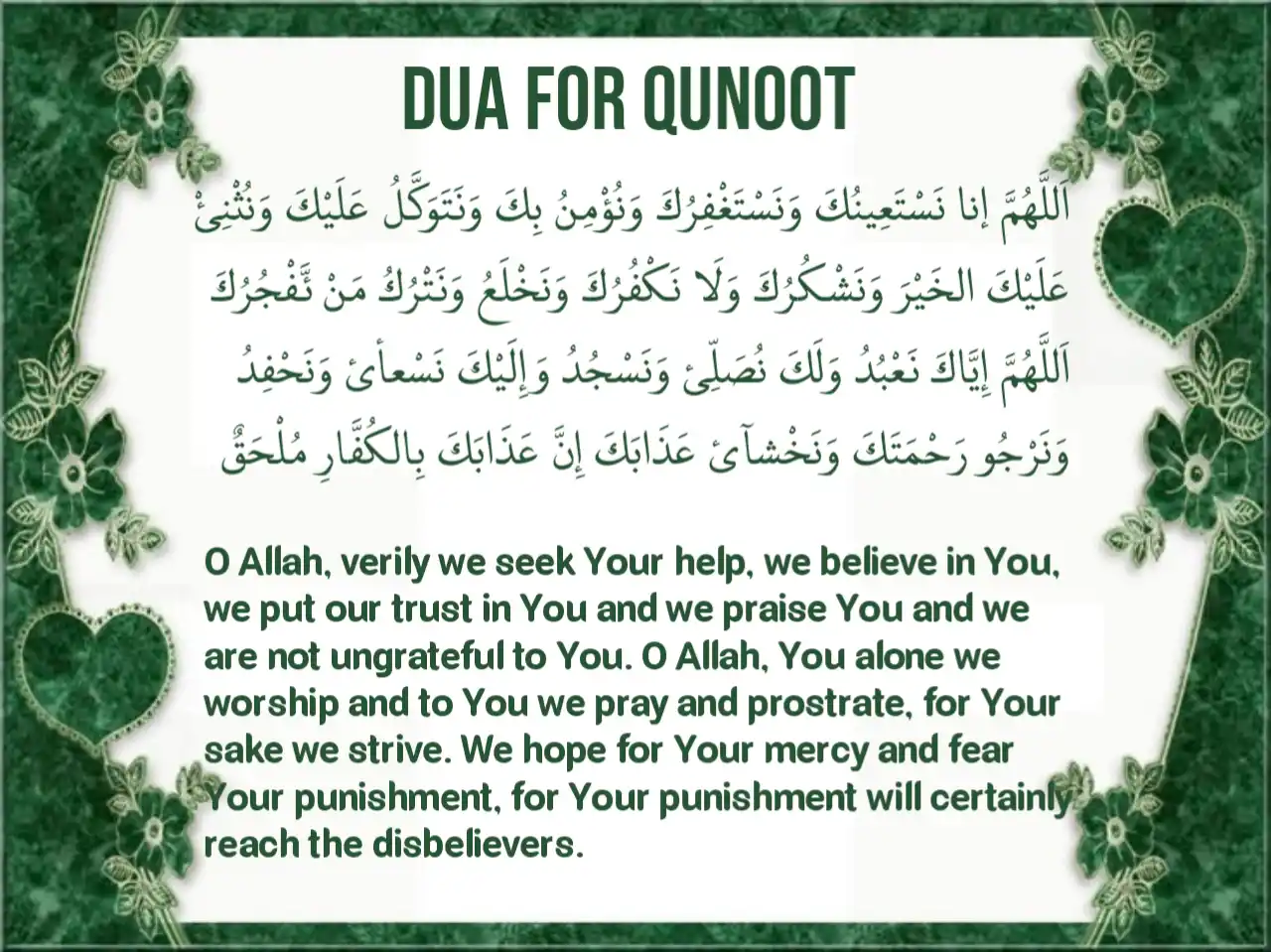
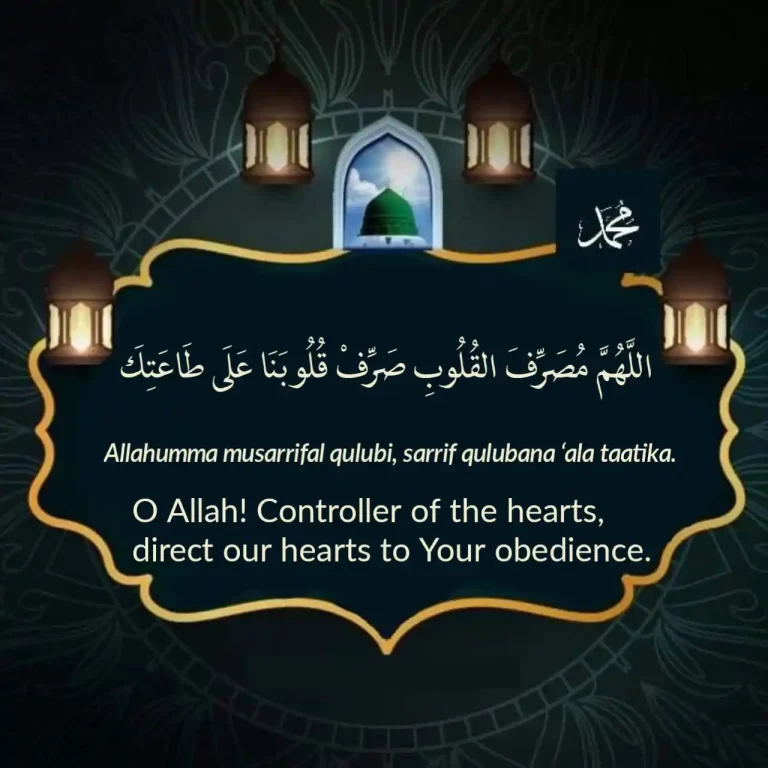
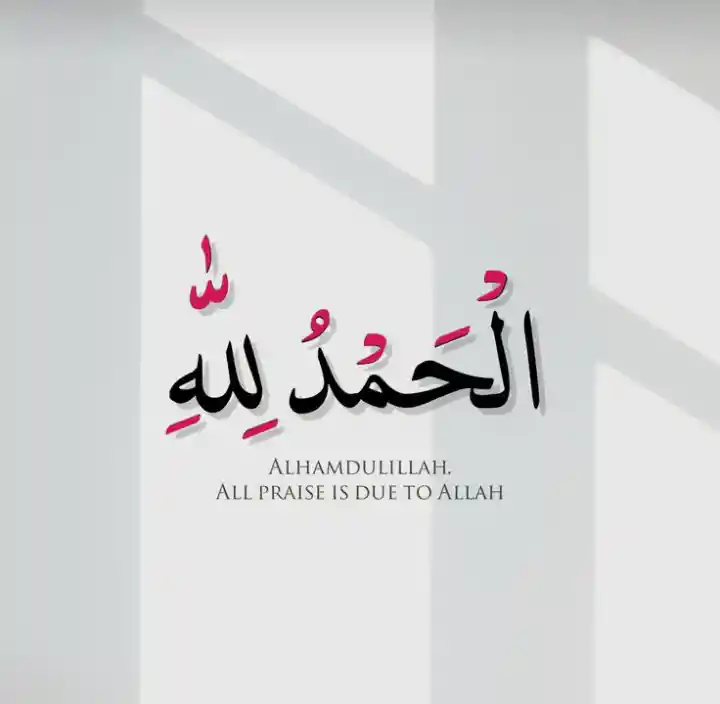
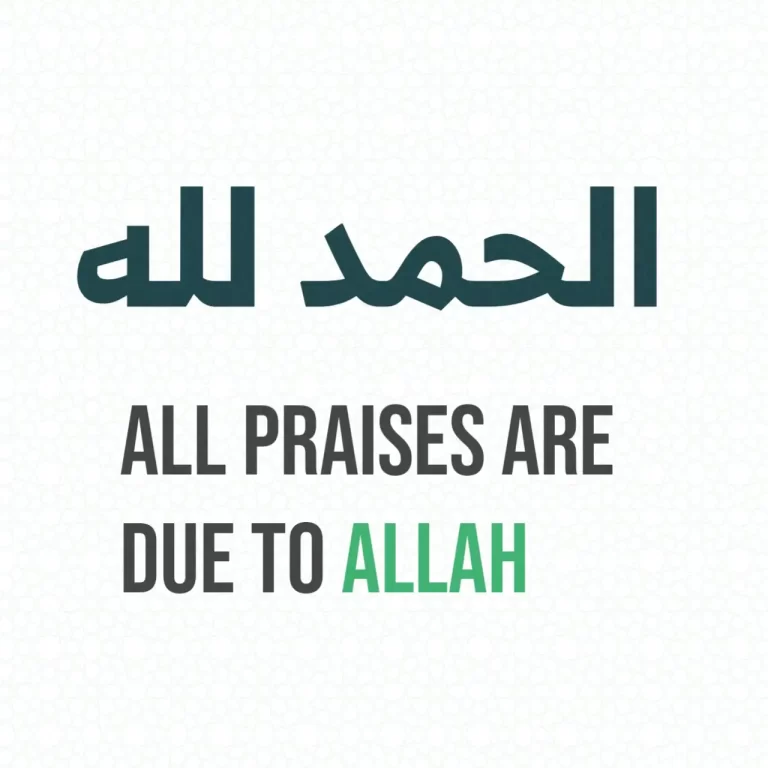
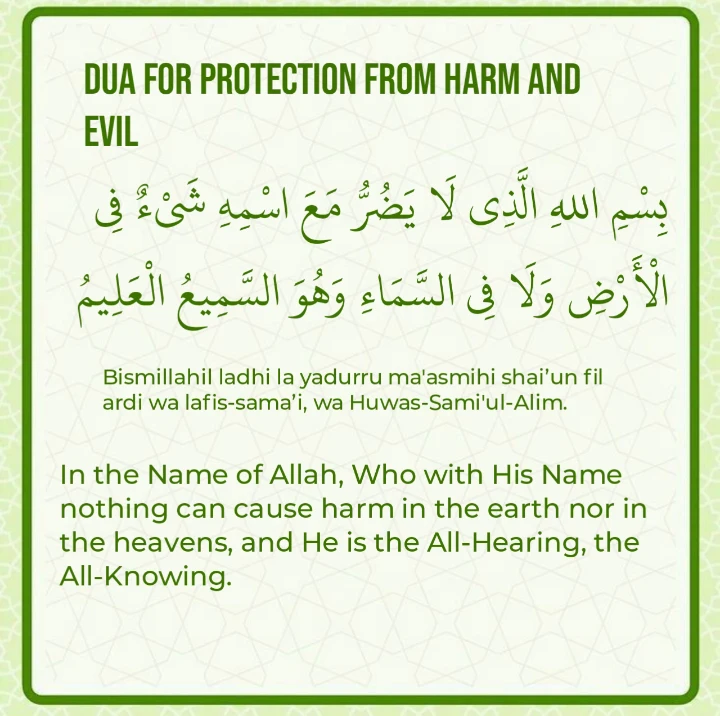
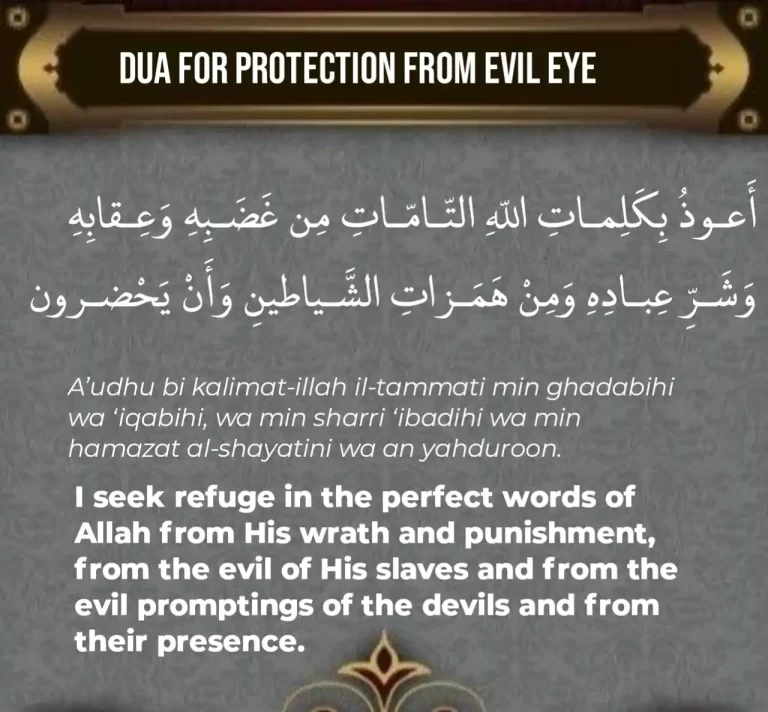
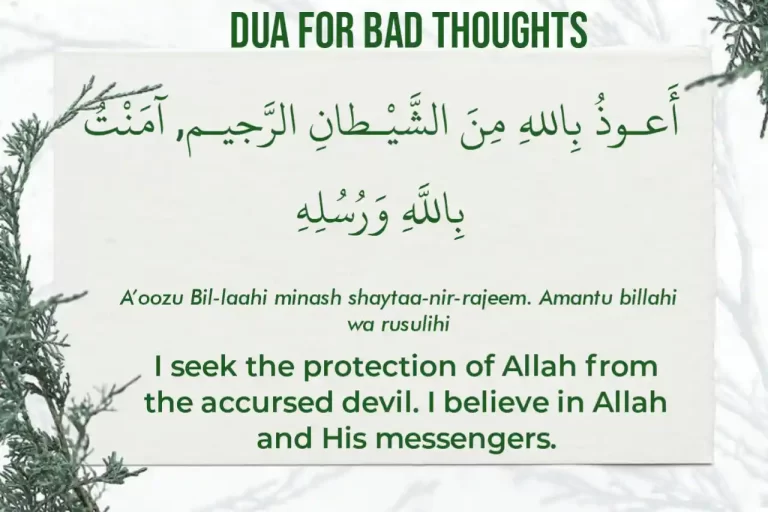
One Comment